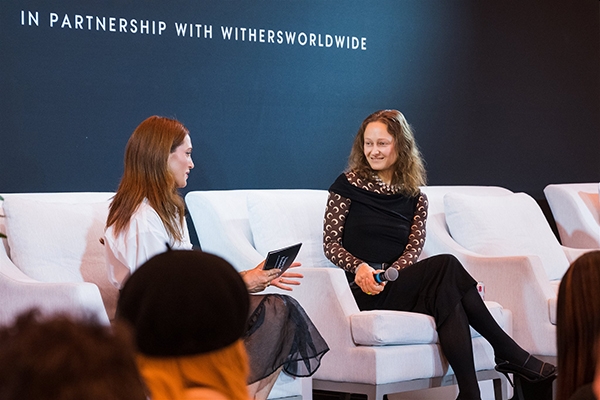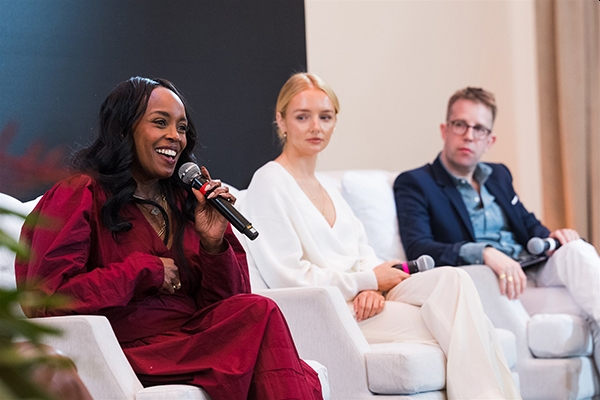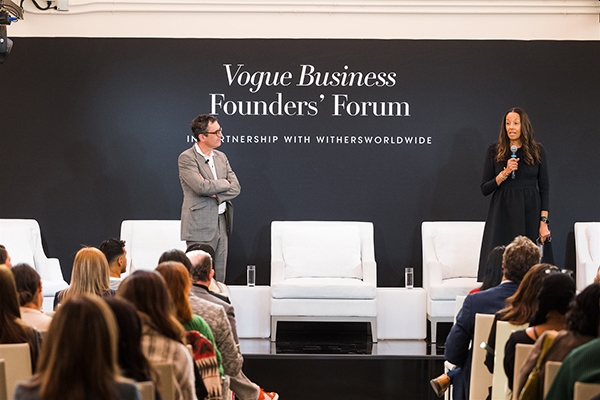It is a pivotal moment for the fashion and beauty industries thanks, in part, to the pandemic. Technology adoption and innovation in fashion and beauty have increased, and the pace of change is accelerating. Consumers and brands are developing their approach to sustainability and are, increasingly, looking at issues through the lens of an honest and transparent discussion as opposed to paying lip service to broad brush statements. Beauty is more than just about looking good; it is about health and wellness. Fashion is increasing in relevance in virtual worlds like gaming and the metaverse.
Against the backdrop of such change, we partnered with Vogue Business to host a Founders' Forum in Los Angeles for fashion and fashion tech, beauty and beauty tech founders and brand leaders. We heard from trailblazing founders about how they built their brands, how they sustain and grow their brands, how they exploit technology, how they value sustainability, how they engage with consumers, and the principles they follow for investment.
We heard from founders at Merit, MYAVANA, Thirteen Lune, Fashionphile, DressX, Bomme Studio, The New Norm, Christy Dawn and SuperOrdinary. We also heard from investment leaders at Greycroft and Connect Ventures.
Here are only a few of the many thought-provoking highlights from the Vogue Business Founder's Forum.
Building and sustaining a brand requires undistracted focus
Sarah Davis, founder and president of Fashionphile, a resale site for luxury accessories, opened the forum by emphasizing that slow and iterative growth as well as hyper-focus only on what you do well are keys to success amid expanding competition and market volatility. Sarah shared that: "we started [Fashionphile] on Ebay, we took every dollar and put in back into the business, we didn't have an investor for nearly twenty years . . . we crushed it because we were the only ones there."
Borrowing a metaphor from Malcolm Gladwell, Sarah compared running a company to flying a plane: there are always distractions around you, but if you focus on and trust your instruments, pay attention to what they are telling you and concentrate on your destination then, you can land the plane.
We started [Fashionphile] on Ebay, we took every dollar and put in back into the business, we didn't have an investor for nearly twenty years . . . we crushed it because we were the only ones there
SARAH DAVIS, FOUNDER AND PRESIDENT OF FASHIONPHILE
Don't use technology for technology's sake, use it to create better products

Left to right: Hilary Milnes, Executive Americas Editor, Vogue Business and Daria Shapovalova, Founder and CEO, DressX
Candace Mitchell-Harris, co-founder and CEO at MYAVANA, a personalized hair care company that uses artificial intelligence (AI) and data science to teach consumers how to care for their own hair, spoke about how to best use technology. Candace shared that MYAVANA uses "data to fuel research, development and marketing teams when it comes to product performance. It's a new way to target consumers-many brands advertise online based on clicks, but our technology helps customers find a product matched to the condition of [an individual's own] hair strands."
A holistic approach to sustainability
"People are really cognizant of sustainability, but there's an awareness versus implementation gap" said Lauren Choi, Founder of The New Norm, a company that creates fabric yarn from recycled plastic cups. And, as consumers demand more transparency and sustainable practices, and brands prioritize circularity in their own approach to beauty products and fashion, forward thinking founders must seek different skill sets to ensure sustainable and innovative supply chains, explained Graham Webster, partner at Withersworldwide, and Bo Metz, founder and CEO of LA based sustainable clothing manufacturer, Bomme Studio.
Choosing an investor is akin to choosing a life partner
Graham Webster of Withersworldwide highlighted that the industry is seeing a proliferation of routes to capital and that, in this context, it is more important than ever to be conscious about the elements of your brand's personality and the alignment of an investor with your core creative proposition. Whether capital is coming from industry angels, private equity, family offices or VC: "It's important for you to do your due diligence. There are princes and princesses out there, but there are also frogs, and one person's prince or princess may be another's frog - so in some respects it's important to approach capital investment much like choosing a life partner, it's a marriage," said Graham.
Nyakio Greico, a co-founder of Thirteen Lune, highlighted the swathe of innovation and creativity underway in the beauty market by black and brown owned companies, and observed that for many black, indigenous, and people of color (BIPOC) and female founders, the biggest challenge is access to capital, unfortunately. Nyakio explained that focusing on storytelling and getting investors and consumers to really understand your company's personality, not just its products, can lead to success in fundraising and growth.

Left to right: Nyakio Grieco, Co-founder, Thirteen Lune, Aila Morin, SVP, Merit and Graham Webster, Partner, Withers
Reflections
Gina Bibby, partner and Head of Fashion Tech at Withersworldwide, said "events like the Vogue Business Founder's Forum are so very important right now. They give us the sense of community that we have lacked for the last couple of years and provide us with new perspectives and opportunities to change the way we approach business."
See also: Highlights from the 2023 Vogue Business Founders' Forum with Withersworldwide, Vogue Business - January 30, 2023

Left to right: Stephen Morgan, Managing Director, Vogue Business and Gina Bibby, Partner, Withers
Photography by David Jon Photography.
The content of this article is intended to provide a general guide to the subject matter. Specialist advice should be sought about your specific circumstances.


